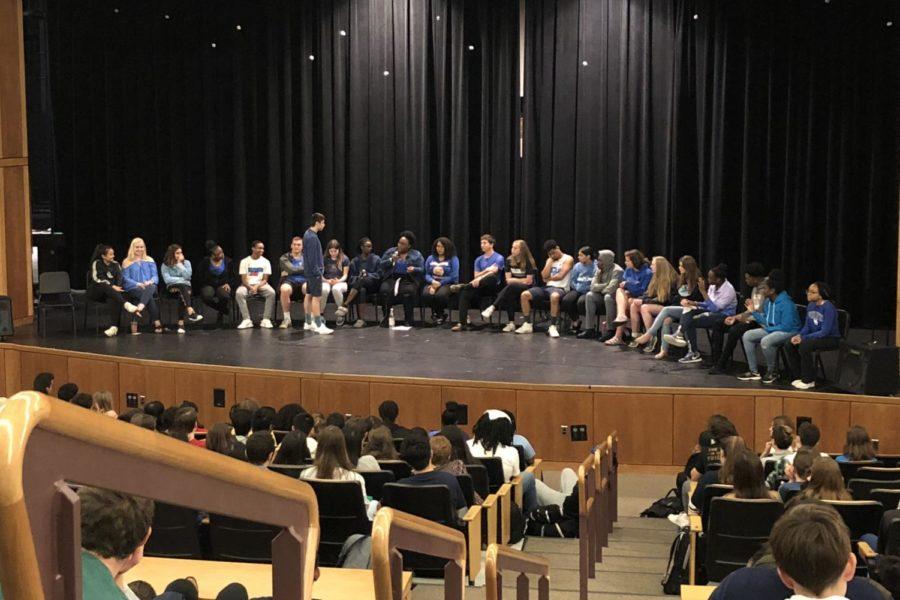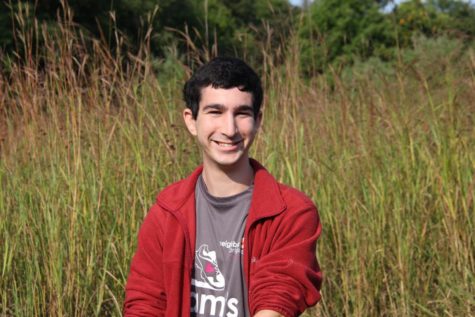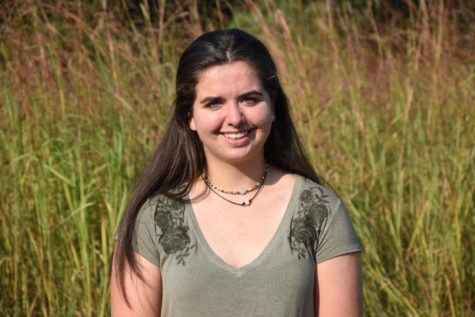METCO panel addresses recent incidents
Credit: Isabel Gitten
Students in the panel sit on stage.
May 18, 2018
During lunch on Monday, May 7, a large group of students from both Wayland and the METCO program led a panel discussion on recent racial tensions at WHS. Led by senior Nia Greenidge, the group shared their feelings and thoughts about METCO, and how it has affected their lives, as well as taking comments from the audience.
“[I think it] was a success; a lot of people came out, and I appreciate that a lot of teachers canceled their classes and had their whole class come,” Greenidge said. “I also appreciate how many people came when it was lunchtime because people like to leave. A lot of people like to go chill with their friends, so I think it was a good turnout, [considering the fact that] it was optional.”
Greenidge originally had the idea to do a walkout, a protest similar to what occurred after the Marjory Stoneham High School shooting, but METCO director Mabel Reid-Wallace brought the idea of running a student-run panel to Greenidge.
“[Reid-Wallace] gave me the idea of a panel because she said it would more powerful if we had Wayland and Boston resident students,” Greenidge said. “I [had] never even thought about it.”
Senior Andrew Glazer, a Wayland resident, sat on the panel as a member of Connect, a class which has been involved extensively with METCO’s 50th anniversary. When the call for panel members went out, Glazer volunteered himself. He believes that the panel was effective for getting students’ attention.
“It was pretty efficient because I feel like [when] students talk to other students, they are more likely to listen, [since] they seeing it from our perspective,” Glazer said. “When teachers are talking, [students] are less likely to view it as informative as they would see it as teachers trying to teach us. When students do it, people are like, ‘these people are my age, I should think and be on their level.’”
During the panel, multiple ideas came up to make sure that such an act wouldn’t happen again. Some ideas discussed included mandatory race seminars to immerse new freshman, reaching across friend groups and stepping out of one’s own comfort zone in order to become more comfortable to race topics. Greenidge believes that year-round immersion is a good way of helping students be more understanding of race.
“My junior year, I had the pleasure of having [history teacher Erin] Lehmann, and she really [taught us about race] within her curriculum,” Greenidge said. “It wasn’t just one unit, one quarter, one semester; it was [continuous], and she kept making sure everyone was represented. I like that style of teaching.”
Greenidge also believes that conversations about race should start much earlier than they do now.
“[We need more talks about race in] middle school, and then high school, [because] that’s where it really changes, and I feel like if we influence it more,” Greenidge said. “Not just eighth grade in middle school, not just first quarter when we are in high school, we have to influence it multiple times throughout the years we are here. [We need to] just make it more known that even though these people are different, [we need to] see the value within them, because we are beautiful people just like everyone else. I feel like [we should] start [these conversations] from sixth grade, and do a little in seventh grade, and do a little bit more in eighth grade and have the main unit as we did when we were in eighth grade.”
Greenidge feels like even though the panel was a good start, she wants to see more change regarding both Wayland and METCO students.
“I want to see so many more people join different clubs and organizations,” Greenidge said. “I want to see more students of color join student council because I’m the only [students of color] on student council and that breaks my heart. We need to have a voice of METCO. I want to see more involvement with the Black History Month Committee, I want to see more involvement with the Diversity Committee and just keep moving forward. I want to see everybody treated as a human being.”
As both Greenidge and Glazer are both seniors, they won’t have much more time to help the community, but they are optimistic about the future.
“I think people will be more observant of these issues,” Glazer said. “Students will be more inclined to speak up.”
In the end, breaking down the racial barriers and accepting one another as a person will allow people to see results.
“We need to have open arms and receptive arms and just really understand that we are all people before anything else,” Greenidge said. “We all are trying to do the same thing, get to [the same] graduation. We all are just trying to get through life.”





![Last Wednesday, the Wayland School Committee gathered to discuss a number of topics regarding the health curriculum and Innovation Career Pathway course. Another large topic of conversation was the ways to potentially mitigate distracting cell phone usage. "These [phones] are going to distract your learning and social relationships," Superintendent David Fleishman said. "That's concrete right there."](https://waylandstudentpress.com/wp-content/uploads/2025/06/Screenshot-2025-06-04-at-9.49.31 PM-1200x886.png)



























![Troy Hoyt finishes the Boston Marathon, running for the Hoyt Foundation. T. Hoyt is the son of Hoyt Foundation CEO Russ Hoyt.
“[Running a marathon] might seem like a big thing, when it’s presented to you at first, but if you break it up and just keep telling yourself, “Yes, you can,” you can start chipping away at it. And before you know it, you’ll be running the whole 26 miles, and you won’t even think twice about it.” T. Hoyt said.](https://waylandstudentpress.com/wp-content/uploads/2025/04/C36E8761-1CBB-452E-9DF2-543EF7B1095E_1_105_c.jpeg)














































